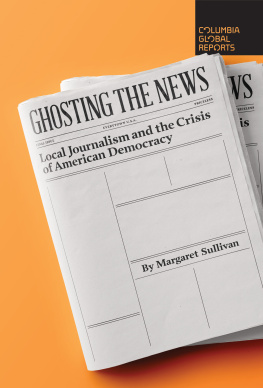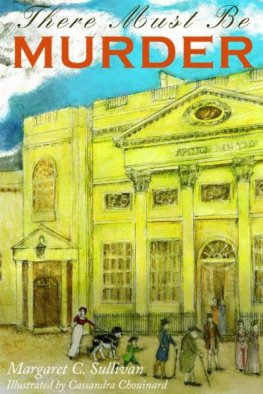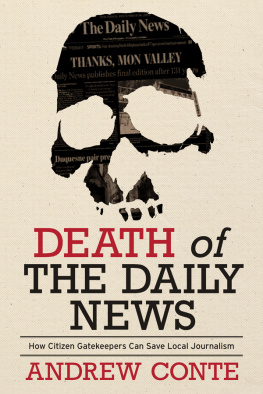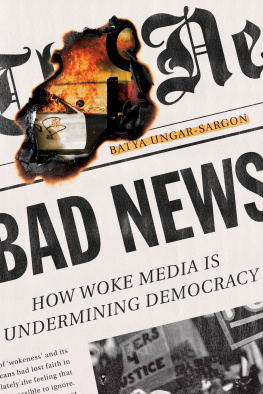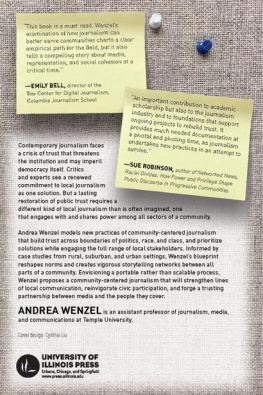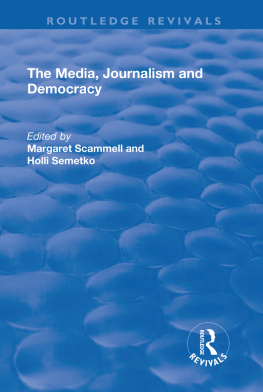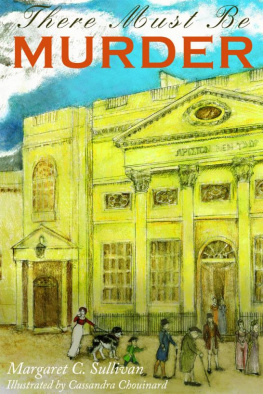Margaret Sullivan - Ghosting the News: Local Journalism and the Crisis of American Democracy
Here you can read online Margaret Sullivan - Ghosting the News: Local Journalism and the Crisis of American Democracy full text of the book (entire story) in english for free. Download pdf and epub, get meaning, cover and reviews about this ebook. year: 2020, publisher: Columbia Global Reports, genre: Politics. Description of the work, (preface) as well as reviews are available. Best literature library LitArk.com created for fans of good reading and offers a wide selection of genres:
Romance novel
Science fiction
Adventure
Detective
Science
History
Home and family
Prose
Art
Politics
Computer
Non-fiction
Religion
Business
Children
Humor
Choose a favorite category and find really read worthwhile books. Enjoy immersion in the world of imagination, feel the emotions of the characters or learn something new for yourself, make an fascinating discovery.
- Book:Ghosting the News: Local Journalism and the Crisis of American Democracy
- Author:
- Publisher:Columbia Global Reports
- Genre:
- Year:2020
- Rating:3 / 5
- Favourites:Add to favourites
- Your mark:
- 60
- 1
- 2
- 3
- 4
- 5
Ghosting the News: Local Journalism and the Crisis of American Democracy: summary, description and annotation
We offer to read an annotation, description, summary or preface (depends on what the author of the book "Ghosting the News: Local Journalism and the Crisis of American Democracy" wrote himself). If you haven't found the necessary information about the book — write in the comments, we will try to find it.
Ghosting the News: Local Journalism and the Crisis of American Democracy — read online for free the complete book (whole text) full work
Below is the text of the book, divided by pages. System saving the place of the last page read, allows you to conveniently read the book "Ghosting the News: Local Journalism and the Crisis of American Democracy" online for free, without having to search again every time where you left off. Put a bookmark, and you can go to the page where you finished reading at any time.
Font size:
Interval:
Bookmark:

Ghosting the News
Local Journalism and the Crisis of American Democracy
Ghosting the News
Local Journalism and the Crisis of American Democracy
Margaret Sullivan
COLUMBIA GLOBAL REPORTS NEW YORK

Ghosting the News:
Local Journalism and the Crisis of American Democracy
Copyright 2020 by Margaret Sullivan
All rights reserved
Published by Columbia Global Reports
91 Claremont Avenue, Suite 515
New York, NY 10027
globalreports.columbia.edu
facebook.com/columbiaglobalreports
@columbiaGR
Library of Congress Cataloging-in-Publication Data
Names: Sullivan, Margaret, 1957-author.
Title: Ghosting the News: Local Journalism and the Crisis of American Democracy / Margaret Sullivan.
Description: New York: Columbia Global Reports, 2020. | Includes bibliographical references. |
Identifiers: LCCN 2020009379 | ISBN 9781733623780 (paperback)
Subjects: LCSH: Journalism, Regional--Political aspects--United States. | Local mass media--United States. | Press and politics--United States--History--21st century.
Classification: LCC PN4784.L6 S85 2020 | DDC 071/.3--dc23
LC record available at https://lccn.loc.gov/2020009379
Book design by Strick&Williams
Map design by Jeffrey L. Ward
Author photograph by Michael Benabib
Printed in the United States of America
For Alex and Grace, and for journalists everywhere
CONTENTS
Ghosting the News
Local Journalism and the Crisis of American Democracy
Introduction
article was routine-enough fare for a local newspaper. It would not go on to win a journalism award or change the world. It didnt even make Sundays front page on that day in May of 2019. It merely was the kind of day-in-and-day-out local reporting that makes secretive town officials unhappy because of what they cant get away with, and lets local taxpayers know how their money is being spent.
OBrien, who reports on several suburban towns for the Buffalo News, had found that the Orchard Park police chief, who was retiring abruptly, would receive an unexplained $100,000 as part of his departure. A few weeks before OBriens story was published, she had asked town officials for the chiefs separation agreement, but they said it couldnt be released because it included a confidentiality clause. Why would there be such a thing, she asked. The town supervisor referred the questions to the town attorney, who wouldnt comment.
OBrien doggedly took the next steps, as her story explained:
The Buffalo News obtained a copy of the sixteen-page agreement after filing a Freedom of Information Law request with the town. Keeping such a contract private is in violation of the Freedom of Information Law, according to Robert J. Freeman, executive director of the state Committee on Open Government.
The contract is public, notwithstanding a confidentiality clause, Freeman said. The courts have held time and again that an agreement requiring confidentiality cannot overcome rights conferred in the Freedom of Information Law.
Examining the agreement, OBrien came across the $100,000 payout, and wrote the story. And she would, of course, keep diggingbecause that is what diligent local reporters do. But there are fewer and fewer of them all the time.
The Buffalo News is the regional newspaper where, until 2012, I served as top editor for thirteen years. Its the largest news organization in New York State outside the New York City metro area. Like virtually every other newspaper in the United States and many around the world, its struggling. In the internet age, circulation volume and advertising revenue have plummeted, and the newsroom staff is less than half what it was when I took the reins, down from two hundred to fewer than a hundred journalists. That sounds bad, but is actually better than most. American newspapers cut 45 percent of their newsroom staffs between 2008 and 2017, with many of the deepest cutbacks coming in the years after that. In some places, the situation is far worse. (I use the term newspapers as a shorthand for newspaper companies, and mean to include their digital, as well as print, presence.)
, government officials conduct themselves with less integrity, efficiency, and effectiveness, and corporate malfeasance goes unchecked. With the loss of local news, citizens are: less likely to vote, less politically informed, and less likely to run for office. Democracy, in other words, loses its foundation.
The decline of local news is every bit as troubling as the spread of disinformation on the internet. Cries of fake news! from President Trump and his sympathizers may seem like the biggest problem in the media ecosystem. Its true that the publics lack of trust in their news sources, sometimes for good reason, is a great worry. But intentional disinformation, media bias, and the disparagement of the press for political reasons are not the subjects of this book. While these may grab the publics attention, another crisis is happening more quietly. Some of the most trusted sources of newslocal sources, particularly local newspapersare slipping away, never to return. The cost to democracy is great. It takes a toll on civic engagementeven on citizens ability to have a common sense of reality and facts, the very basis of self-governance. So Ill be clear: Im not here to address the politicized fake news problem or the actual disinformation problem. This book is about the real-news problem.
Welcome to Ground Zero, said Mark Sweetwood, managing editor of the Youngstown Vindicator, when I told him, in the center of his newsroom (one that no longer exists), about the book I was researching on the troubles of local news. I came to the Ohio city only four days after a stunning announcement that an already battered community took like a sucker punch: Their daily newspaper was going out of business. August 31, 2019, would be the last day it published.
The Vindicator is far from alone. More than two thousand American newspapers have closed their doors and stopped their presses since 2004. And many of those that remain are mere shadows of their former selves. Consider Denver, where the Denver Post and the Rocky Mountain News boasted six hundred journalists twenty years agoa robust group to cover a city, surrounding metro area, and much of Colorado as a whole. Both papers won Pulitzer Prizes. That situation has changed radically. The Rocky, as it was known, went out of business in 2009. And the Denver Post, owned by a hedge fund fronted by a group called Digital First Media, is down to under seventy in its newsroom. theres a knot in my gut to see what we built up over time torn down in this relentless way, Greg Moore told me in 2018. He was the Posts top editor from 2002 to 2016, when he stepped away, disheartened by what he called the ownerships harvesting strategy.
My old paper, the Buffalo News, is facing an existential threat. It lost money in 2018 for the first time in decades. This development was frightening to its employees and management, though unknown to almost all local residents. Why would they think the paper was hurting? After all, there were so many years that the News would send a million dollars a week to its Omaha-based owner, Warren Buffetts Berkshire Hathaway. (Until early 2020, Berkshire owned dozens of papers, including the Omaha World-Herald.) And though Buffett, who bought the paper in the 1970s, says he loves newspapers, he had made it clear that he was not inclined, over the long term, to support papers that are losing money. He believes in the purpose of journalism but is not a newspaper philanthropist; the interests of Berkshires shareholders come first. And the famed investor is extremely bearish about the future of local newspapers.
Next pageFont size:
Interval:
Bookmark:
Similar books «Ghosting the News: Local Journalism and the Crisis of American Democracy»
Look at similar books to Ghosting the News: Local Journalism and the Crisis of American Democracy. We have selected literature similar in name and meaning in the hope of providing readers with more options to find new, interesting, not yet read works.
Discussion, reviews of the book Ghosting the News: Local Journalism and the Crisis of American Democracy and just readers' own opinions. Leave your comments, write what you think about the work, its meaning or the main characters. Specify what exactly you liked and what you didn't like, and why you think so.

